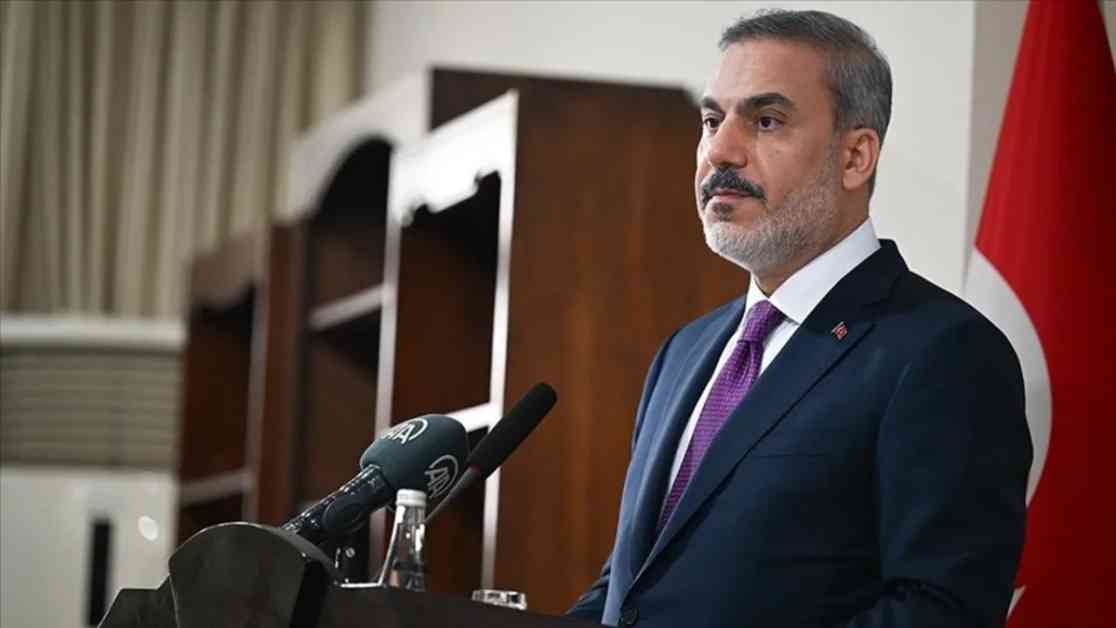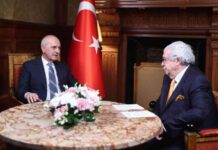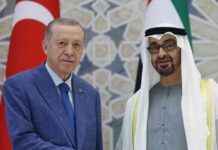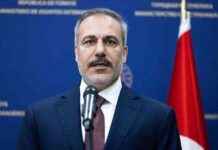Title: Minister Fidan’s Response to Yahya Sinvar Assassination and Potential Iran-Israel Conflict
In a recent development, Israeli forces claimed that Hamas leader Yahya Sinvar has been killed. However, Foreign Minister Hakan Fidan emphasized that without confirmation from Hamas, these allegations cannot be accepted. Minister Fidan also discussed the possibility of a war between Iran and Israel, urging preparedness for such a scenario.
Minister Fidan addressed the public during a live broadcast, touching upon various pressing issues. Regarding the alleged assassination of Hamas leader Yahya Sinvar by Israeli forces, Fidan stated that he awaits an official statement from Hamas before drawing any conclusions.
Key points from Minister Fidan’s statements include:
The Warning Signs of a Wider Conflict:
Since the beginning of the conflict, we have issued warnings about the potential escalation of the situation. We predicted that this war would not be contained and could lead to further destabilization, causing fractures along fault lines. This escalation is unfolding before our eyes. Until Hamas confirms otherwise, it is premature to accept the news of Yahya Sinvar’s death.
Current Situation in Gaza and Lebanon:
We were aware of Israel’s plans to eliminate threats posed by Hamas, followed by Hezbollah and then the Houthis. The attack on Lebanon did not come as a surprise to us. In the first three weeks after October 7, our main concern was to prevent the spread of the conflict. We do not want to see multiple fronts open, nor do we wish to see a strategy where Israel focuses on Gaza first and then shifts its attention elsewhere, but it appears that Israel is pursuing its intended targets.
We are currently facing intertwined incidents, with the ongoing Gaza massacre, the situation in Lebanon, and the possibility of a war with Iran. Each of these dynamics has its own complexities, and we are fully aware of them. Before this conflict, many states in the region already had issues with Iran and its proxies. The intertwining of this matter with the Palestinian issue is a great misfortune. When it comes to Lebanon, they did not show the same sensitivity. It is crucial to share our analyses, but even more important is the fact that many states are unable to take a stance. Turkey is issuing serious warnings, sending messages, and sharing sensitive information that might not be suitable for public disclosure.
The Need for Regional Cooperation:
In the face of these escalating tensions, regional cooperation and unity are more vital than ever. The potential conflict between Iran and Israel could have far-reaching consequences, affecting not only the immediate region but also global stability. It is imperative for all stakeholders to engage in dialogue, de-escalate tensions, and seek peaceful resolutions to prevent further bloodshed and chaos.
Regional Diplomacy and Crisis Management
As the situation continues to evolve, diplomatic efforts must be intensified to prevent the conflict from spiraling out of control. Regional powers, including Turkey, must play a proactive role in mediating discussions and finding common ground among conflicting parties. The stakes are high, and the repercussions of inaction could be catastrophic for the entire region.
Humanitarian Concerns and International Response
Amidst the escalating violence and geopolitical tensions, the humanitarian crisis in Gaza and other affected areas must not be overlooked. International organizations and governments must step up their efforts to provide aid, ensure the safety of civilians, and uphold human rights standards. The international community’s response to the crisis will be a litmus test of its commitment to peace, justice, and stability.
In conclusion, the developments in the region demand a coordinated and strategic approach to prevent further escalation and mitigate the impact of potential conflicts. Minister Fidan’s remarks underscore the urgency of the situation and the need for proactive measures to avert a full-blown crisis. As events continue to unfold, it is essential for all stakeholders to prioritize dialogue, cooperation, and diplomacy in pursuit of lasting peace and stability in the region.











